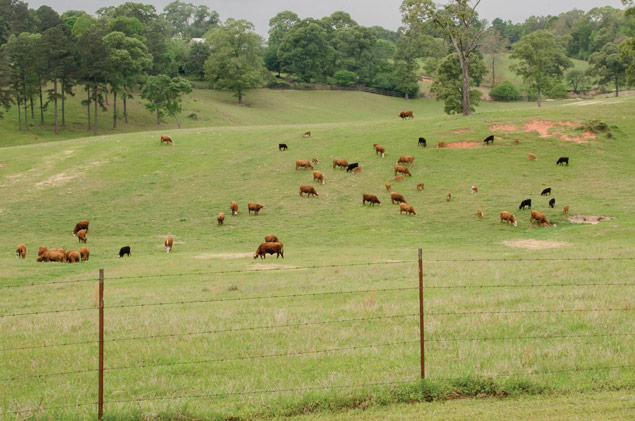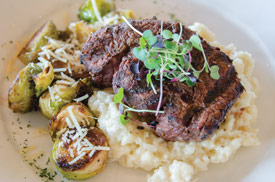
Photo by Patty Stewart
Red Brangus, Hereford and Angus cattle graze the lush, rolling pastures of Kingsland Ranch near West Monroe, La.
On a weekday evening in West Monroe, La., the aroma of charbroiled steak wafts through Restaurant Sage, an upscale farm-to-table eatery owned by Dr. Terry King and his wife, Nancy.
King, a highly respected heart specialist, has just finished a long day at the clinic where he practices pediatric cardiology. But while a cheerful Sage waitress takes dinner orders and his grandkids play at an outdoor table, the King family patriarch delights in talking about another passion — the cattle ranch he’s built into a brand.
“See all my cuts and burns,” King says, holding out his scratched-up forearms. “Those are from burn piles on our ranch. My family and I have put thousands and thousands of hours into clearing land and building Kingsland Ranch. They’ve spent a lot of time picking up sticks.”
“Yes, a billion sticks,” his stepson, Jay Yates, says grinning.
Son David King, who manages the ranch, started clearing Kingsland’s rolling timberland at an early age with another brother, Brady.
“Dad would drop us off with a chain saw, machete, slash blade, gasoline and a cup of water,” he says. “For several years, we cleared by hand.
Then we used a tractor. To this day, we’re still clearing land by hand
and dozer.”
Over the years, Kingsland Ranch has grown into an 850-acre cattle operation that produces pasture-raised beef without antibiotics or hormone additives. In 2007, the Kings opened Restaurant Sage, which dishes up contemporary Cajun cuisine. Today, Yates oversees the restaurant, as
well as sales and marketing for the ranch.
“The two are connected in that the ranch produces most of the hamburger and some of the steak items featured on Sage’s menu,” Yates says. “We like to use the phrase ‘from farm to table’ to promote Kingsland Ranch beef at the restaurant.”
Over at Sage’s outdoor grill, chef Andrew Whittaker, armed with a pair of tongs, prods and turns a selection of sizzling thick burger patties and steaks. Soon the waitress brings plates of steaming-hot food: Charbroiled burgers with crispy fries. Peppered filets set atop champagne risotto with roasted brussels sprouts on the side. Flame-kissed ribeyes accompanied by roasted asparagus and creamy mashed potatoes.
“Mmm, isn’t this just the best ribeye you’ve ever tasted?” King asks, as he cuts off and savors a tender bite.

Photo by Sheryl Smith-Rodgers
Reared on a Ranch
Nearly 15 miles southwest of Restaurant Sage, cattle graze the lush green slopes of Kingsland Ranch.
“I bought my first 75 acres in 1978,” King recalls. “With help from the Louisiana Land Bank, I’ve been chipping away at the land around us ever since, buying up 40 acres here and 400 acres there.”
As his loan officer since the 1980s, Louisiana Land Bank Vice President Keith Post has witnessed the development and transformation of Kingsland Ranch.
“Dr. King has bought parcel after parcel and slowly brought the land into its full potential by making improvements,” Post says. “He has a passion for both his pediatric heart practice and his farm.”
That deep love for the country reaches back to King’s childhood. Reared on a South Texas ranch, he grew up roping and corralling cattle on horseback.
“My daddy was a true Texas cowboy who had no fear of anything,” he says. “Every night, he’d tell me to go get the cows and bring them on up. Once a year, we had cattle roundups. Daddy raised Brahman cattle, the meanest breed there is. I always swore I’d never own any.”

Photo by Sheryl Smith-Rodgers
Cardiologist Dr. Terry King, center, grew up working cattle in South Texas. Today, he operates Kingsland Ranch in Louisiana with son David King, left, and stepson Jay Yates.
Medical Career Starts in Military
After his medical residency at Duke University, King joined the Air Force and was stationed at Wilford Hall Medical Center at Lackland Air Force Base in San Antonio. After two years in the military, he joined Ochsner Medical Center in Jefferson, La.
While at the Ochsner clinic, he worked with Dr. Noel Mills, a renowned heart surgeon at the time, to develop a cardiac umbrella that could fit through a catheter and close a hole in a heart. The invention circumvented the need for open-heart surgery. In 1975, for the first time, King implanted the new device in a young patient. The successful procedure made the national news, and the following year, he and Mills were nominated for the Nobel Prize in physiology. Since then, more than a million heart patients have benefited from implanted devices.
Shortly after leaving the Ochsner Clinic in 1978 and opening his own practice in Monroe, King bought his first piece of land, fulfilling a lifelong dream to have his own ranch.
“At first, I had registered red Brangus cows,” he says. “But eventually, I realized that the registered business was a hard avenue. As a businessman, I believe that in order to sell something, it has to either be something to eat, be entertaining or be something that people need. Based on those concepts, I decided to get into the beef business in 1999.”
Producing Beef Naturally
As a medical doctor, King well understands the importance of diet and its effects on the human body.
“I grew up where we ate everything we raised,” he says. “We knew where our food came from and what was in it. That’s not so true these days. That’s why, about 15 years ago, we started producing beef that’s healthier to eat.
“We use no antibiotics or hormones. We make our own feed, so we know what’s in it. If a calf is sick, then we remove it from the line, treat it, and then sell it for slaughter to someone else,” says King.
On the ranch, David manages the breeding operation and oversees the herd, which is built on three breeds.
“Red Brangus are good moms, gentle, and tolerate heat and insects. Herefords have larger ribeyes, and Black Angus are known for their marbling,” he says.
To make their own natural feed, the Kings grow 250 acres of bermudagrass hay and grind it with molasses and either cracked corn and soybean meal or local distiller’s grains. The cattle are fed on the ranch, rather than in a feedyard, which allows the family to monitor carcass quality. They do that by using ultrasound to measure the live cattle’s intermuscular fat, which determines fat marbling in the ribeye muscle and thus the meat flavor.

Photo by Sheryl Smith-Rodgers
Preparing the Perfect Steak
Pay a bit more and buy a piece of high-quality meat.
“Buy prime that’s been well-aged,” Jay Yates advises. “We age our Kingsland Ranch beef for a maximum of 30 days. You also want a cut with lots of marbling.”
Season your steak with salt, pepper and olive oil.
“Keep it simple,” says Yates. “Then throw it on the grill. Watch it carefully. Cook it just how you like it!”
Sold by Restaurants and Retailers
Once a month, two 1,400-pound steers are selected for slaughter at a nearby custom processing facility, where sides of beef are hung and aged. Then the beef is packaged with the Kingsland Ranch brand and sold at seven retail locations.
“We also sell directly to the public and to restaurants, like Sage. In the future, we hope to process three or four steers a week,” says Yates. “Our ultimate goal is to produce enough beef to ship our meat nationwide.”
Compared with commercially packaged meat, Kingsland Ranch beef may cost more, the Kings admit, but it’s for a reason.
“We market our meat at higher prices because it takes longer to grow our cattle out,” Yates explains. “Hormones make a cow grow faster. Because we don’t use hormones, then it costs more to feed them longer. Many health-conscious customers appreciate that.”
Meanwhile, at the restaurant, the dining tables are cleared, and the King family members say their goodbyes. If there’s time before dark, King might climb on his bulldozer and clear some more timber.
“I love what I do, every bit of it, both at the clinic and on the ranch,” he says. “I love to learn, and I love new adventures. And Kingsland Ranch has certainly been a wonderful adventure.”